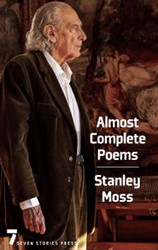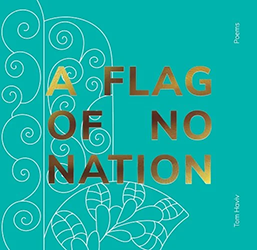Meditations on meaning, science, language, history, and identity — American, Jewish, and personal — dominate the pages of Stanley Moss’s latest collection, Abandoned Poems. Ranging from the contemplation of chaos to commentary on the Trump presidency, the most powerful pieces in this volume present themselves to the reader as deeply personal and autobiographical. In these poems, which build on the autobiographical free verse tradition with us since William Wordsworth, Moss looks back on a complex, storied life, merging his own lived experiences with engagements — many real and some imagined — with other poets, thinkers and artists across time.
In these pieces Moss’s lyrical I (literary theorist and writer Ihab Hassan’s term) is at once a time-traveler and commentator. In the ironically titled “Get Out,” for example, Moss imagines himself as a refugee from the 1290 English Edict of Expulsion. Here the poet pictures himself circling through France down to Córdoba, hoping to grab a look at the Roman de la Rose along the way before crossing the Pyrenees into Spain. Elsewhere, he listens to the violent story of a combatant in World War II, only to end up along with said veteran at William Carlos Williams’s funeral. Here Moss has a wonderful vision:
I feel I’m driving a double deck bus
along the Tiber in Rome
I’m dreaming, void of guile,
we’re near the Isola Tiberina
the bus loaded with poets
Some cold sober
some drunk some high.
(“Street Music”)
This particularly beautiful poem plays with the Anglo-Saxon split line, making the passenger-reader swerve along with the driver-poet through this adventure in time and space.
In another directly autobiographical poem Moss eulogizes a second cousin in emotionally clipped lines. Distance and affection juxtapose each other until the emotionally resonant ending:
We were Great Depression grandchildren
Our kind left behind in Lithuania murdered
For the fifty or sixty pleasures
Murdering can bring. Family resemblance?
In our chins a certain courage.”
(“Afterword for Howard Moss”)
But perhaps the most moving elegy in this collection is the wry, conversational poem about John Ashbery. At once a letter to the poet and a celebration of him, Moss’s words join his own sense of mortality with memories of people, sense impressions, and a genuine love for the other, very famous poet:
I’ve got nothing
To say today except I wish it was beginning
Summer for you.
(For John Ashbery, September Song)
Appropriately in this collection about letting go, Moss abandons hope of being the poet Ashbery was (“these words are proof/how absolutely ordinary I am”), and he indulges his erudition in languages, art, and literature, all the time carefully controlling how the lines work on the page. Levity alternates with something deeper and Moss asks us — through his poems of surrender, departure, and passion — to consider our own abandoned projects, not the least of which may be our own democracy:
Life is suddenly a battlefield,
The world needs you more than anyone.
(“Yusef Komunyakaa”)
Stephanie Barbé Hammer’s is a 7‑time Pushcart Prize nominee in fiction, nonfiction, and poetry. Her new novel Journey to Merveilleux City appears with Picture Show Press.





